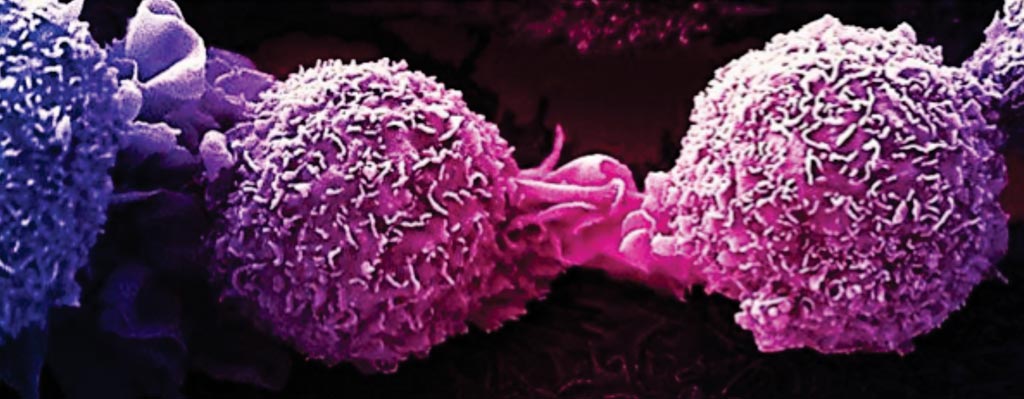Disease-Associated Variants in Genes Allow Early Diagnosis
By LabMedica International staff writers
Posted on 10 Oct 2018
Sequencing the exomes of patients can identify breast cancer risk variants, even in patients without a family history of cancer or who otherwise would not be considered to be at an elevated risk.Posted on 10 Oct 2018
Current methods to identify BRCA1/2 variant carriers may not be sufficient as a screening tool; population genomic screening for hereditary breast and ovarian cancer may better identify patients at high risk and provide an intervention opportunity to reduce mortality and morbidity.

Image: A scanning electron micrograph of dividing breast cancer cells (Photo courtesy of National Cancer Institute).
A team of scientists working with the Nationwide Children’s Hospital (Columbus, OH, USA) performed a cross-sectional study of 50,726 adult volunteers who underwent exome sequencing at a single health care system (Geisinger Health System, Danville, PA, USA) from January 1, 2014, to March 1, 2016. Comparisons were made between those with (cases) and those without (controls) P/LP variants in BRCA1/2. Prevalence of P/LP BRCA1/2 variants in cohort, proportion of variant carriers not previously ascertained through clinical testing, and personal and family history of relevant cancers among BRCA1/2 variant carriers and non-carriers.
The team reported that of the 50,726 health system patients who underwent exome sequencing, 50,459 (99.5%) had no expected pathogenic BRCA1/2 variants and 267 (0.5%) were BRCA1/2 carriers. Of the 267 cases, 148 (55.4%) were women and 119 (44.6%) were men with a mean age of 58.9 years), 183 (68.5%) received clinically confirmed results in their electronic health record. Among the 267 participants with pathogenic or likely pathogenic (P/LP) BRCA1/2 variants, 219 (82.0%) had no prior clinical testing, 95 (35.6%) had BRCA1 variants, and 172 (64.4%) had BRCA2 variants.
Syndromic cancer diagnoses were present in 11 (47.8%) of the 23 deceased BRCA1/2 carriers and in 56 (20.9%) of all 267 BRCA1/2 carriers. Among women, 31 (20.9%) of 148 variant carriers had a personal history of breast cancer, compared with 1,554 (5.2%) of 29,880 non-carriers (odds ratio [OR], 5.95). Ovarian cancer history was present in 15 (10.1%) of 148 variant carriers and in 195 (0.6%) of 29, 880 variant non-carriers (OR, 18.30). Among 89 BRCA1/2 carriers without prior testing but with comprehensive personal and family history data, 44 (49.4%) did not meet published guidelines for clinical testing.
The authors concluded that the study found that compared with previous clinical care, exome sequencing–based screening identified five times as many individuals with P/LP BRCA1/2 variants. These findings suggest that genomic screening may identify BRCA1/2-associated cancer risk that might otherwise remain undetected within health care systems and may provide opportunities to reduce morbidity and mortality in patients. The study was published on September 21, 2018, in the journal JAMA Network Open.
Related Links:
Nationwide Children’s Hospital
Geisinger Health System













